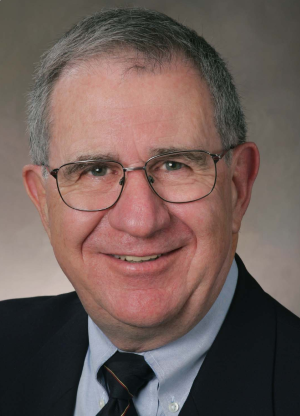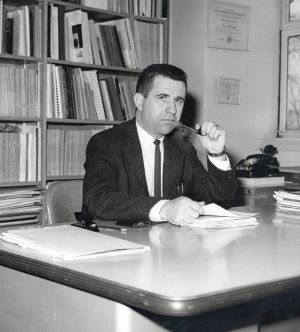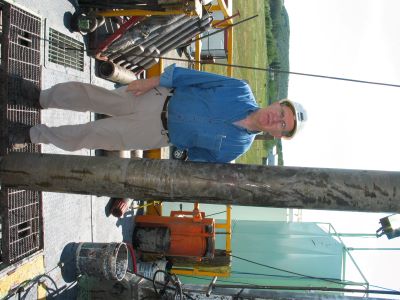In Memory of APEGA Past-President Gordon Williams
By Colin Yeo, P.Geo., FGC, FEC (Hon.), CSPG President (2007) and APEGA President (2013) and
Ian McIlreath, P.Geo., FGC, FEC (Hon.), CSPG President (1983) and GAC President (1993)
A consummate professional geologist, educator, mentor, leader, facilitator, enabler, and friend—and always with his dry humour—Dr. Gordon Williams led the quest for geoscience professional recognition across Canada while educating generations of petroleum explorationists.

Early days
Fate conspired to make Gordon Williams a geologist. As a student at Brandon College—now Brandon University—and a member of the Science Club, he went on a field trip to the Virden oilfield in Manitoba. The field operator, California Standard, offered Gordon a part-time job as a geological assistant.
Upon graduation, Gordon joined the company to do field work in Alberta’s Crowsnest Pass. With his interest in geology piqued by the work, and encouraged by his former principal at Brandon College, he began his master’s degree in geology at the University of Alberta in 1956. A year later, based on Gordon’s high marks, the chair of the geology department encouraged him to pursue his Ph.D. In 1960, he became the first Ph.D. student in geology to graduate from University of Alberta, having completed his thesis on the Mannville Formation in Central Alberta.
He then joined Standard Oil Company of Indiana and worked there for 18 months, but his real interests lay in academia.
A gifted and practical teacher
Gordon was always keen to learn and transfer his knowledge to others. His greatest thrill was watching students as they first understood a new concept or learned a new skill. He was also practical and wanted to prepare them for the reality of working in a cyclical industry that could impact them economically and professionally. He encouraged them to be generalists with skills valuable to potential employers and the ability to move into new areas when presented with an opportunity. Right from the beginning as a teacher, he espoused the advantages of lifelong learning and continuous professional development.
In 1961, Gordon accepted a professorship at the University of Alberta, taking a position at the University of Queensland in Brisbane, Australia, two years later to develop a petroleum geology program. In 1966, he returned to the University of Alberta to help primarily with the administration of a growing department. During that time, he taught and supervised many undergraduate and graduate students, served as department chair for more than three years, and continued to pursue independent research.
 Later, after a short stint in industry with Suncor Energy and five years in private practice with his consulting company, Summus Resource Evaluations, Gordon returned to academic life, taking up the post of dean of science and technology at Mount
Royal College. He retired in 1995 and returned to private practice once again.
Later, after a short stint in industry with Suncor Energy and five years in private practice with his consulting company, Summus Resource Evaluations, Gordon returned to academic life, taking up the post of dean of science and technology at Mount
Royal College. He retired in 1995 and returned to private practice once again.
But Gordon never really left teaching. In his private practice, he focused on teaching petroleum geology, subsurface methods, stratigraphy, and computer applications in petroleum exploration, in Canada and internationally. From 1989 to 2015, he was a sessional instructor in the Petroleum Land Management Program at the University of Calgary’s Haskayne School of Business. The conclusion to his sessional course, Introduction to Petroleum Land Management, was the famous oil and gas exploration interactive workshop.
The workshop was developed by John Cox, P.Geol., Wayne Lannan, P.Land., and Gordon. It was a unique physical simulation model that tied together most of the upstream (exploration and development) segments of the oil and gas industry in Western Canada. Students learned to use geological reports and seismic data to acquire mineral rights through purchase or negotiations. They could drill simulated exploration and development wells in the physical model and experience the thrill of discovery or the disappointment of a dry hole. The model even included building and operating oil and gas facilities. The team with the most money at the end of the evening was the winner.
However, the key to success in the game, as in the real world, included understanding the geology and geometry of the oil and gas plays, developing successful corporate and exploration strategies (including the use of joint ventures), and estimating risk and return.
It was a remarkable example of experiential learning and was so popular that some oil companies in Calgary, and internationally, used the workshop in their educational programs. It was also used to teach some Alberta First Nations community leaders the essentials of the industry.
Gordon never stopped teaching, and he left behind generations of petroleum industry practitioners and executives with the knowledge and experience to find and develop oil and gas reserves. He enabled people to do great things.
A leader in geoscience professionalism: persistence, patience, and practicality
Geologists are a fiercely independent group who traditionally have resisted licensure and regulation. They argue geoscientists should be judged on their results, not on their knowledge and experience. Years ago, Gordon faced this resistance head-on. He believed that geology was a rigorous and virtuous profession; that geology programs at universities were not accredited across the country; and that practitioners must be licensed by their peers, not universities or technical organizations, to protect the public interest.
He knew regulating the practice of geology would be complex and expensive because of the small number of geologists, so he concluded that its professional affairs should be administered by a larger regulator. From his experience as a professor and industry practitioner, he knew geologists in the petroleum industry were closely aligned with their engineering colleagues, and he believed APEGA, the current regulator, was therefore best positioned to regulate the practice of geology within Alberta.
To Gordon, this was obvious, but there was strong opposition from within the geological community. As always, he was up for the challenge.
In 1960, APEGA became Canada’s first regulator of geoscientists—the next provincial regulator wouldn’t come about until more than 20 years later.
In 1980, a number of geoscientists in Alberta again questioned the need for professional regulation and wondered if technologist associations—such as the Canadian Society of Petroleum Geologists (CSPG) and the Canadian Society of Exploration Geophysicists (CSEG)—might be better suited to do so. On October 7 that year, Gordon organized a panel discussion in front of 800 geoscientists at the Calgary TELUS Convention Centre to hear the pros and cons of geoscience regulation and who should regulate geoscience. From that meeting, the Professional Registration Committee was formed, with members from CSPG and CSEG. Gordon was selected as chair.
Over the next year, the committee confirmed that geologists and geophysicists wanted to be regulated and that APEGA was still the most appropriate body to do that. The committee found that the cost and complexity of having CSPG and CSEG regulate the professions was just too much. In a conciliatory move, a hallmark of Gordon’s skill as a negotiator, he and the committee formed a permanent CSEG/CSPG/APEGA Liaison Committee to maintain direct and open dialogue with APEGA Council—the committee operated until 2013. CSPG and CSEG never again raised the issue of regulating geoscience. The matter was settled, at least in Alberta. It was no small feat, but Gordon had created a consensus among a widely divided geoscience community.
 Gordon didn’t stop there. He saw a burgeoning movement developing across Canada to begin licensing geoscientists, either by jointly regulating them with engineers or through separate acts, and he saw an opportunity to enhance their professional
mobility. The key was developing a common syllabus for geology, geophysics, and environmental geoscience, and instituting standard registration practices in each jurisdiction. However, he first had to help professional geoscience committees in various
provinces get their members on board with registration and prepare to work patiently through government departments to bring in the legislation. He worked tirelessly with each group and faced setbacks with stoicism and a resolve to continue. While
others began to lose hope, Gordon remained steadfast in his vision.
Gordon didn’t stop there. He saw a burgeoning movement developing across Canada to begin licensing geoscientists, either by jointly regulating them with engineers or through separate acts, and he saw an opportunity to enhance their professional
mobility. The key was developing a common syllabus for geology, geophysics, and environmental geoscience, and instituting standard registration practices in each jurisdiction. However, he first had to help professional geoscience committees in various
provinces get their members on board with registration and prepare to work patiently through government departments to bring in the legislation. He worked tirelessly with each group and faced setbacks with stoicism and a resolve to continue. While
others began to lose hope, Gordon remained steadfast in his vision.
Initially, the work of creating a national coordinating body of independent provincial and territorial regulators was done by the Canadian Geoscience Council’s National Registration Committee. With his good friend and colleague, Dr. Hugh Miller, P.Geo. (Nfld.), Gordon compiled a draft national syllabus for geology and presented it to geology department heads at Canadian universities, where it was soundly rejected.
Recognizing this was an insurmountable problem, the ever-practical Gordon transferred the committee from the Canadian Geoscience Council to the newly formed Canadian Council of Professional Geoscientists (CCPG), which was supported by APEGA and the Canadian Council of Professional Engineers. A standards committee was formed at CCPG, through which national standards for geology, geophysics, and environmental geoscience were developed. The Canadian Council of Professional Geoscientists, later to become Geoscientists Canada, was incorporated in 1997.
Gordon served as CCPG’s first and founding president from 1997 to 1999 and served again from 2003 to 2004, as four additional provinces began geoscience regulation. His vision was pan-Canadian geoscientist mobility and, to accomplish this, he knew academic and experience requirements would have to be standardized across all jurisdictions and reciprocal practice arranged with other jurisdictions.
Perhaps the most significant contribution to achieving his vision was the creation of the Geoscience Knowledge and Experience Requirements for Professional Registration in Canada. Again, with Dr. Miller, he analyzed the honours bachelor science degrees in geology from across Canada and created a syllabus to be used by academic reviewers in each jurisdiction.
Similarly, a syllabus for practical geological experience was created. Gordon recruited and organized experts in geophysics and environmental geoscience to develop academic and experience syllabuses. These syllabuses are now recognized by registrars as a true national standard and have even been upheld by the courts. Today, because of Gordon’s work, geoscientists can work anywhere in the country and be recognized as professionals, just like engineers, lawyers, and doctors.
For his vision, dedication, and hard work on professional licensure and the creation of the CCPG, Gordon was a most worthy recipient of APEGA’s prestigious L.C. Charlesworth Professional Service Award, the Geological Association of Canada’s J. Willis Ambrose Medal, the rarely given CSPG President’s Special Recognition Award, Geoscientist Canada’s Canadian Professional Geoscientist Award, and in 2021, the Brandon University Alumni Association Distinguished Award for Career Achievement.
The presidencies: duty calls
As much as Gordon was driven by promoting professionalism in the geosciences, he also believed it was an obligation to give something back to the profession. Although the CSPG is strictly a learned society, Gordon viewed it as a necessary vehicle for furthering technical development of geoscientists once they graduated, which is an essential element of being a professional.
Gordon joined the CSPG in 1960, when he first started working at California Standard, as it was an expectation that all geologists would become members. He first served on the CSPG board as a director in 1977. In 1980, he chaired the very important Professional Registration Committee, for which he was given the President’s Award in recognition of his work. In 1984, he was elected CSPG vice-president. He served as its president in 1985 and past-president in 1986.
Gordon was skilled at enabling others to work better and achieve more. As was his style as CSPG president, he met with committee chairs to reaffirm their mandates, increase activity, and become more effective. He set up a Management Task Force to devise new management strategies for the society and was awarded CSPG honorary membership in 2005.
Fittingly, in 2008, the International Year of Planet Earth, Gordon was elected APEGA president, the 10th geoscientist to fill that position in 88 years. He had served 10 years on APEGA’s Board of Examiners, six years on its Practice Review Committee, and four years on its Discipline Committee. He entered office wanting to increase the licensure rate of geologists and geophysicists and to enhance the mobility of engineers and geoscientists, making it easier for them to work throughout the country. He made a great effort to address the issue of short-term, incidental practice within the geoscience community but recognized that any possible arrangement would be too costly for smaller jurisdictions, causing more problems than were solved. Above all, Gordon was a practical leader who knew some problems were just complex and confounding, and therefore, not easily solved.
Gordon worked with the Association of Science and Engineering Technology Professionals of Alberta (ASET) to combine APEGA and ASET under one legislation. He began the process of introducing APEGA to the professional geoscientist, or P.Geo., designation, which merged the professional geologist (P.Geol.) and professional geophysicist (P.Geoph.) designations and brought APEGA in line with the rest of Canada. He made significant inroads with many U.S. states and other countries to recognize APEGA member credentials, which would enhance the international mobility of APEGA members.
As a champion of inclusivity, throughout his years with APEGA, Gordon portrayed engineers and geoscientists as being two sides of the same coin. He maintained there were far more similarities between the professions than differences. He always sought to find common ground.
Later years
A true teacher, Gordon continued instructing at the University of Calgary until 2015. He maintained a great interest in geoscience professional matters, being briefed by current Geoscientists Canada directors and offering advice and guidance right to the end. He never lost interest. His more than 60 years of professional advocacy enabled him to cut through the minutiae and focus on the really important items so meaningful progress could be made. He knew how to get the most out of everyone and his expectations made people work that much harder. We were all better because of Gordon. His legacy lives on in the geoscience profession.
Well-liked, life-affirming, and easygoing, the champion of geoscience professionalism in Canada is gone, and we will miss him.
Note
The Association of Professional Engineers and Geoscientists of Alberta (APEGA) has undergone a couple name changes in its history:
- 1920: The Association of Professional Engineers of Alberta (APEA)
- 1969: The Association of Professional Engineers, Geologists and Geophysicists of Alberta (APEGGA)
- 2012: The Association of Professional Engineers and Geoscientists of Alberta (APEGA)
For ease of reading, we have used APEGA throughout this in memoriam.
